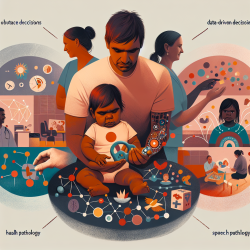Introduction
In the quest to improve health outcomes for Aboriginal and Torres Strait Islander children, a recent study titled Patterns of Health and Health Service Use in a Prospective Cohort of Aboriginal and Torres Strait Islander Children Aged 5–9 Years Living in Urban, Regional and Remote Areas of South Australia offers valuable insights. This research, published in the International Journal of Environmental Research and Public Health, examines health conditions and service use among these children, providing data-driven insights that can guide practitioners and policymakers.
Key Findings
The study involved a cohort of 344 Aboriginal and Torres Strait Islander children from urban, regional, and remote areas of South Australia. The findings reveal that 62.7% of the children experienced one or more physical health conditions, 27.3% faced mental health issues, and 24.8% had developmental conditions in the year preceding the study's second wave of data collection. These statistics highlight the urgent need for targeted interventions and support services.
Implications for Practitioners
For practitioners, the study underscores the importance of recognizing the diverse health challenges faced by Aboriginal and Torres Strait Islander children. Here are some actionable insights:
- Holistic Health Assessments: Regular and comprehensive health assessments are crucial for early identification of physical, mental, and developmental conditions. Practitioners should advocate for and facilitate these assessments, especially in underserved areas.
- Culturally Responsive Care: Providing culturally sensitive care is essential. Practitioners should engage with Aboriginal and Torres Strait Islander communities to ensure that health services are respectful of cultural practices and beliefs.
- Interdisciplinary Collaboration: Collaboration between general practitioners, specialists, and allied health professionals, including speech pathologists, can enhance the quality of care. Integrated care models that include these professionals can address the complex needs of these children.
- Advocacy for Policy Change: Practitioners can play a vital role in advocating for policy changes that improve access to health services for Aboriginal and Torres Strait Islander children. This includes lobbying for increased funding for outreach programs and culturally appropriate services.
Encouraging Further Research
While this study provides a comprehensive overview of health conditions and service use, there is a need for further research to explore the underlying causes of health disparities and the effectiveness of different intervention strategies. Practitioners are encouraged to contribute to research efforts by sharing insights from their clinical practice and participating in collaborative studies.
Conclusion
The health and well-being of Aboriginal and Torres Strait Islander children are of paramount importance. By implementing the findings of this study and advocating for evidence-based policies, practitioners can make a significant impact on improving health outcomes. The commitment to culturally responsive, data-driven care is essential in achieving equitable health services for all children.
To read the original research paper, please follow this link: Patterns of Health and Health Service Use in a Prospective Cohort of Aboriginal and Torres Strait Islander Children Aged 5–9 Years Living in Urban, Regional and Remote Areas of South Australia.










